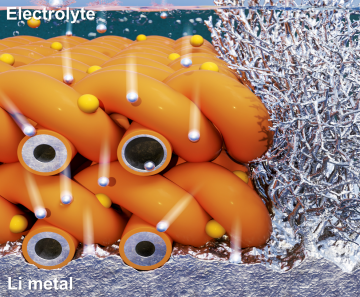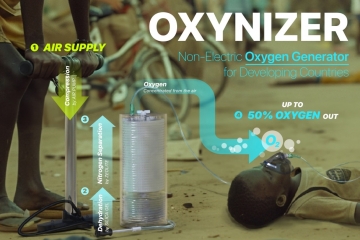KAIST
BREAKTHROUGHS
Research Webzine of the KAIST College of Engineering since 2014
Spring 2025 Vol. 24Blood-based multiplexed diagnostic sensor helps to accurately detect alzheimer’s disease
Blood-based multiplexed diagnostic sensor helps to accurately detect alzheimer’s disease
A research team at KAIST reported a clinically accurate multiplexed electrical biosensor array for detecting Alzheimer’s disease with densely aligned single-walled carbon nanotube thin films. The sensor shows an average sensitivity of 90.0%, a selectivity of 90.0%, and an accuracy of 88.6%.
Article | Spring 2020
A research team at KAIST reported a clinically accurate multiplexed electrical biosensor for detecting Alzheimer’s disease by measuring its core biomarkers.
Alzheimer’s disease is the most prevalent neurodegenerative disorder, affecting one in ten people over 65 years of age. Early diagnosis can reduce the risk of developing the disease by one-third, according to recent reports. However, its early diagnosis remains challenging due to the low accuracy and high cost of diagnosis.
A research team led by Professors Chan Beum Park and Steve Park described the ultrasensitive detection of multiple Alzheimer’s disease core biomarkers in human plasma. The team designed the sensor array by employing densely aligned single-walled carbon nanotube thin films as a transducer.
The representative biomarkers of Alzheimer’s disease are beta-amyloid42, beta-amyloid40, total tau protein, and phosphorylated tau protein, and the concentrations of these biomarkers in human plasma are directly correlated with the pathology of Alzheimer’s disease.
The research team developed a highly sensitive resistive biosensor based on densely aligned carbon nanotubes fabricated using the Langmuir-Blodgett method with a low manufacturing cost.
Aligned carbon nanotubes with high density minimize the tube-to-tube junction resistance compared with randomly distributed carbon nanotubes, which increased the sensitivity of the sensor. Specifically, this new sensor exhibits a sensitivity over 100 times higher than that of conventional carbon nanotube-based biosensors.
By measuring the concentrations of four Alzheimer’s Disease biomarkers simultaneously, the sensor array successfully discriminates the clinically diagnosed Alzheimer patients from healthy controls with an average sensitivity of 90.0%, a selectivity of 90.0%, and an average accuracy of 88.6%.
This work, entitled “Clinically accurate diagnosis of Alzheimer’s disease via multiplexed sensing of core biomarkers in human plasma”, was published in Nature Communications on January 8, 2020. The authors include PhD candidate Kayoung Kim and MS candidate Min-Ji Kim.
Professor Chan Beum Park said, “This study was conducted on patients who are already confirmed with Alzheimer’s Disease. For further use in practical settings, it is necessary to test patients with mild cognitive impairments.” He also emphasized that, “It is essential to establish a nationwide infrastructure, such as a mild cognitive impairment cohort study and a dementia cohort study. This would enable the establishment of a worldwide research network and help various private and public institutions.”
This research was supported by the Ministry of Science and ICT, the Human Resource Bank of Chungnam National University Hospital, and Chungbuk National University Hospital.
Most Popular

When and why do graph neural networks become powerful?
Read more
Smart Warnings: LLM-enabled personalized driver assistance
Read more
Extending the lifespan of next-generation lithium metal batteries with water
Read more
Professor Ki-Uk Kyung’s research team develops soft shape-morphing actuator capable of rapid 3D transformations
Read more
Oxynizer: Non-electric oxygen generator for developing countries
Read more

